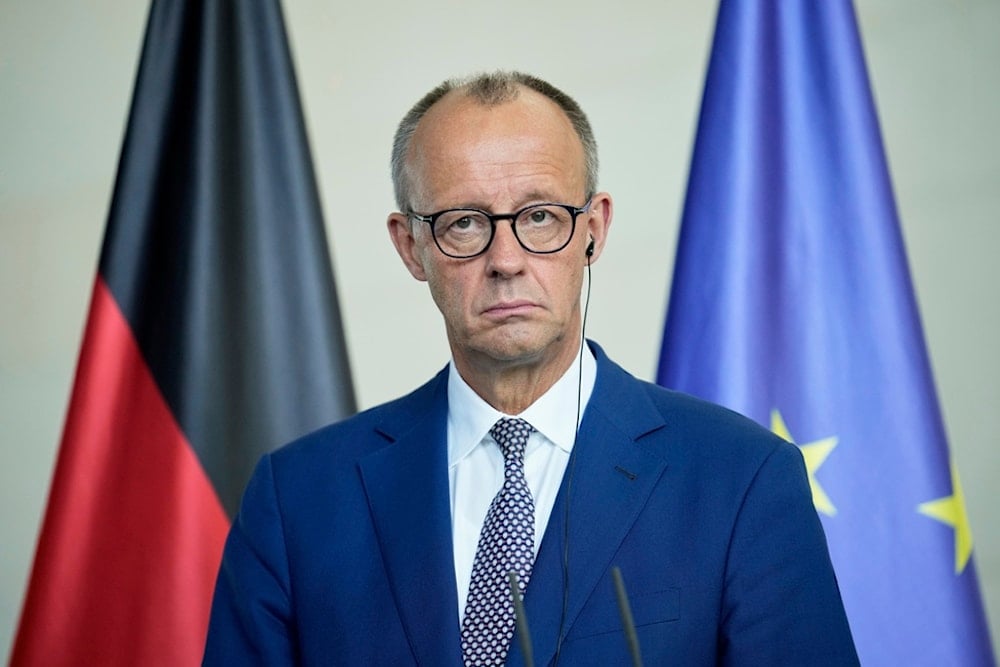Merz under fire for rejecting West's joint Gaza ceasefire call
For critics, Merz's decision is yet another example of selective outrage and quiet complicity.
-

German Chancellor Friedrich Merz attends a joint press conference with Romania's President Nicusor Dan at the chancellory in Berlin, Germany, Friday, July 18, 2025 (AP Photo/Ebrahim Noroozi)
Germany's refusal to sign a recent joint declaration demanding an immediate end to "Israel's" war on Gaza has ignited criticism from within Chancellor Friedrich Merz's own governing coalition, as global frustration mounts over Western double standards and complicity.
The statement, issued by 29 Western governments, including France, the UK, Canada, and the EU's foreign policy chief, described the humanitarian catastrophe in Gaza as "horrifying," citing the deaths of over 800 Palestinians while trying to obtain basic aid. It condemned the "drip feeding of aid and the inhumane killing of civilians, including children," and called on "Israel" to "immediately lift restrictions on the flow of aid and to urgently enable the UN and humanitarian NGOs to do their life-saving work safely and effectively."
Germany, however, chose not to sign, even as the civilian death toll continues to climb. Reem Alabali Radovan, Germany's international development minister and a member of the SPD, the junior coalition partner, voiced clear disapproval: "The demands in the letter from the 29 partners to the Israeli government are understandable to me. I would have wished for Germany to join the signal sent by the 29 partners."
Merz Shields "Israel"
For critics, Merz's decision is yet another example of selective outrage and quiet complicity. While the Chancellor has publicly stated that the Israeli army's actions are "not acceptable" and acknowledged "the great suffering of the civilian population," his government continues to shield "Israel" from consequences and maintains business as usual behind closed doors.
Government spokesperson Stefan Kornelius insisted that Merz and the foreign minister had expressed views "in terms of substance and significance" equal to those in the declaration. But for many observers, this defense rings hollow. As with other Western governments who finally spoke out this week, Germany's sudden concern follows, rather than precedes, months of horror on the ground, and only after global outcry reached a boiling point.
Impunity Guaranteed
More troubling to many is Merz's willingness to host Prime Minister Benjamin Netanyahu in Germany, despite an outstanding ICC arrest warrant for war crimes. While the court's founding statute obliges all EU member states, including Germany, to arrest Netanyahu if he enters their territory, Merz has made clear he will do no such thing.
Read more: Merz says will find a way for Netanyahu to visit without arrest
This refusal to act has prompted further rebuke from SPD leaders. In a joint statement, Adis Ahmetovic and Rolf Mützenich declared, "The situation in Gaza is catastrophic and represents a humanitarian abyss," demanding that Germany not only endorse the ceasefire call but also "suspend EU-Israel agreements and halt arms exports that violate international law."
Weaponized Remorse
Germany's historical doctrine of Staatsräson, a supposed moral obligation to unconditionally support "Israel" due to the legacy of the Holocaust, is increasingly being viewed not as an ethical compass, but as a political shield for silence and complicity. Critics argue that invoking this legacy while ignoring the mass killing and starvation of Palestinians is a perverse betrayal of the post-Holocaust pledge of "never again."
As more voices across the world continue to take principled stances in support of Palestinian rights, Germany and other Western governments are finding themselves exposed, not for lack of rhetoric, but for the emptiness behind it. For many Palestinians and their allies, Berlin's abstention is just the latest reminder that Western outrage is often a matter of timing and convenience, not principle.

 4 Min Read
4 Min Read








